
Anger management has received a bad rep. Comedic movies, such as Anger Management, have poked fun at the idea and practices.
Whether anger is a sign of weakness, or simply a primal human emotion, may be the subject of long debate.
Regardless of the source, the expression of anger has become more prevalent and unhealthy as the world has become more stressed, crowded, alienated, and complex.
As clinicians, we can no longer just encourage our clients to “let it all out” and hope that that will solve the problem. We must be equipped with both a knowledge of anger and its mechanisms, as well as the techniques that allow our clients to tame the beast.
The new course on Anger Management
- reviews the research about anger,
- summarizes the impact of anger on one’s mind, body and spirit,
- and provides access to Dr. David B. Wexler’s comprehensive Anger Management Program.
There are numerous perspectives on anger. Several earlier assumptions have changed drastically over time.
- Buddhists believe that a strong thought or feeling of hatred can ruin one’s sense of happiness, peace, or calm.
- Catholics tie the expression of anger to self-importance.
- The dominant theory of anger during Freud’s time was the Hydraulic Model of Anger.
- Modern behavior theorists believe that the experience of anger relies heavily on the individual’s interpretation of events.
- The Ventilationist Approach to anger management articulated the health benefits of the outward expression of anger, over and against its suppression.
- The Psychoanalytic Approach suggests that the direct expression of anger can be the most effective way to release tension.
- Sociocultural theories suggest that anger develops when expectations are not met.
- Many scholars discuss how some forms of expression of anger can be appropriate and evolutionarily adaptive.
A review of the current data available about anger and its management:
- The response of anger is the result of an interaction between eliciting events, the individual’s pre-anger state, appraisals of the eliciting events, and the individual’s coping resources.
- An angry or aggressive parenting style has a very significant impact on the development of similar angry parenting styles in one’s offspring.
- Those with high trait anger report more drug and alcohol use.
- Those with more narcissistic or borderline personality styles express more anger towards others.
- Individuals who express a high level of assertiveness also express overt forms of anger and aggression. On the other hand, those with a low level of assertiveness experienced more covert anger.
- A person’s commitment to a religious faith has great bearing on the level of anger experienced or expressed.
- Anger evokes physiological responses that are potentially life threatening in individuals with coronary artery disease.
- Exercise can have a limiting effect on the experience of anger.
- The appraisal and expression of anger involves limbic, para-limbic, and cortical areas of the brain.
- David Dibble suggests that traditional anger managementdoes not manage anger, but attempts to manage behavior created by angry people.
- According to Dibble, the transformation of anger requires the Masteries of Awareness and Transformation. The first Mastery is waking up to the fact that YOU are not angry; your mind is creating angry thoughts, beliefs, or memories, and you are not your mind.
- According to Wexler, physical red flags of anger might include muscle tension, increased heartbeat, and even disorientation.
- Self-talk red flags are statements made in the mind about the negative qualities, traits, or thoughts about others that promote anger expression (for instance, “She’s making fun of me!”).
- Early shaming experiences may trigger the urge to avoid similar experiences and the urge to place blame on others. Those who externalize blame may also turn their rage on others to regain some sense of self.